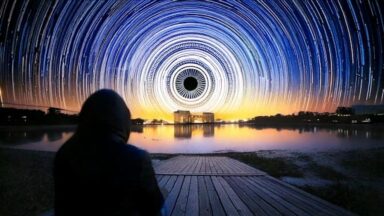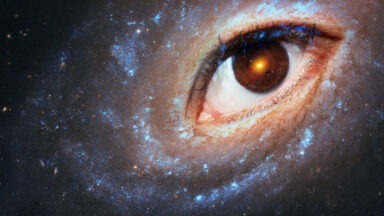Is a Parallel Universe Changing Our Reality?

Sometimes referred to as the Berenstain Bears Conspiracy, the Mandela Effect is a phenomenon in which people report having the same false memories, leading to a belief that something is changing reality.
We all experience life through our own subjective lenses, interpreting day-to-day happenings differently than everyone else. This contributes to individuality, free will, and the ability to think for ourselves. But of course, the way that we witness our world often results in lapses of memory or perception. We sometimes seem to remember events happening differently than others or our perception of time is skewed.
And individual memory lapses are easily written off when everyone else’s memory says otherwise. But how does one explain false memories that are held by a significantly large portion of the population?
Confabulation is the psychiatric term for replacing a gap in your memory with a falsification. So, what about mass confabulation? Well, that’s become a conspiracy of sorts, referred to as The Mandela Effect.
Examples of The Mandela Effect
The Mandela Effect was given its name by Fiona Broome, who seemed to remember hearing about the death of Nelson Mandela on the news while he was imprisoned in the 1980s. In “reality,” Mandela survived until late 2013 and did not even become president of South Africa until 1994. But as it turned out, her memory was shared by a deluge of similarly convinced people, resulting in many other instances in which large swaths of the population have claimed to experience the same confabulated memories.
Could this be the result of one person incorrectly remembering a historical event or cultural icon propagating their misinterpretation to be inaccurately remembered by the masses? Or could it be evidence of a multiverse in which waves of events from a parallel universe have washed over into ours, creating subtle nuances in the time-space continuum, where there was once a children’s book called the Berenstein Bears, instead of the Berenstain Bears? It’s more interesting to explore the latter.
While the Berenstain Bears is ostensibly a mundane and inconsequential example of the Mandela Effect, there are other instances that are so uncanny, they’re hard to ignore. For example, when Darth Vader reveals his paternalistic relationship to Luke in Star Wars, most remember him saying, “Luke, I am your father.” In ‘reality,’ he says, “No, I am your father.” While an intransigent Star Wars fan might scoff at someone who misquotes such an important scene, it can’t be ignored that most people remember it in the former. Even James Earl Jones, who voiced Darth Vader, remembers the line incorrectly.
Movie quotes aside, an example of a famous real-life event that has been brought into the mystery of the Mandela Effect regards the famous protester at Tiananmen Square. The ‘Tank Man,’ whose defiant act of rebellion, standing in front of a tank with grocery bags in hand, is remembered by many as resulting in his death from being run over. In fact, he was not run over and there is no evidence of it, but many remember his crushing demise distinctly.
This is nothing new to those familiar with the theory and there are many other examples that support it; so many that there is an entire subreddit devoted to the effect. With topics ranging from movies that never existed to discrepancies in historical events, people vehemently claim to remember very particular things differently, but on a large, collective scale. Some people’s reactions are visceral when they experience new revelations due to the Mandela Effect, to the point of incurring panic attacks or questioning reality.
Mandela Effect Theories and CERN
One pragmatist theory for explaining the Mandela Effect is that it is simply a failure in the collective memory. Our brains are very easily influenced by our own filters, as well as the perception of others. Many common instances of the Mandela Effect are trivial and maybe just went unnoticed in the past, or are the result of conclusions that our brains jump to based on the context of an image or video. But some are substantial, like an entire country hundreds of miles out of place.
One of the more intriguing theories that attempt to explain this phenomenon points a finger at CERN and the large hadron collider in Switzerland. CERN’s experiments are intended to find elusive particles that could potentially show evidence of a multiverse, create tiny black holes, or discover dark matter. While all of this sounds very exciting, it also sounds potentially dangerous. What could possibly go wrong if we opened up a black hole in Europe, or tapped into another dimension with consequences unknown? While the scientists at CERN assure us their experiments are conducted on such a controlled, small scale as to have little, if any, negative consequences, some believe that their meddling in quantum fields has led to some strange effects, resulting in some kind of interdimensional entanglement.

One of the quantum particles that CERN has been searching for is the graviton. These elusive particles correspond with how gravity would react between different dimensions and are still only hypothetical, but the way CERN describes them is intriguing.
“If gravitons exist, it should be possible to create them at the LHC, but they would rapidly disappear into extra dimensions. Collisions in particle accelerators always create balanced events – just like fireworks – with particles flying out in all directions. A graviton might escape our detectors, leaving an empty zone that we notice as an imbalance in momentum and energy in the event. We would need to carefully study the properties of the missing object to work out whether it is a graviton escaping to another dimension or something else.”
Is CERN inducing these gravitons, creating holes to other dimensions, and swapping idiosyncrasies in our world? Or are we just having a collective memory lapse?
The 37th Parallel – A Line of Mystery and Significance

The 37th parallel is a circle of latitude that runs around the Earth at 37 degrees north or south of the equator. While it may seem like just another line on a map, the 37th parallel has gained an unusual reputation over the years.
Not only does it serve as a border between U.S. states, but it is also considered “America’s Paranormal Highway“—a hotspot for UFO sightings, cattle mutilations, and other unexplained phenomena. Additionally, the 37th parallel north plays a role in human health, geological activity, and historical significance.
This article explores the geographical location of the 37th parallel, its paranormal history, and other ways this latitude has left its mark on science and culture.





































